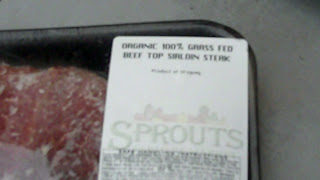Grass-fed? Natural? Organic? Certified? Which of these are actually important when it comes to finding a quality piece of meat, and what do they mean?
Before discussing the labels, lets establish an ideal: we want meat that is free of hormones, antibiotics, comes from livestock that lived a humane and healthy life, and provides the most nutrients possible. In regard to optimal nutrient density, cows' natural food is grass, and unsurprisingly, meat from grass-fed cows has the highest levels of vitamins A, C, E, and omega-3 fatty acids (as opposed to the factory farming cows, which eat grains, corn, soybeans, and other harmful items)
Keeping that in mind, let's look at what the USDA meat labels mean:
- Certified: USDA has "evaluated a meat product for class, grade, or other characteristics."
- Grass-Fed: animal did have at least some grass in his/her diet. This is not legally verified or guaranteed.
- 100% Grass-Fed: the animal lived off of a grass diet only. Again, no verification or guarantee.
- Kosher: the meat was prepared "under rabbinical supervision."
- Natural: meat was only minimally processed (not fundamentally altered) and contains no "artificial ingredient or added color."
- No Hormones: a label that can be used if USDA sees documentation that no hormones were used.
- No Antibiotics: another label used when the farmer can provide "sufficient documentation" of the described condition.
- Organic: animals were not given hormones or antibiotics. They had access to the outdoors, "adequate" space to exercise, and were given organic feed 100% of the time (not necessarily grass).
Considering the ideal of being hormone/antibiotic-free, humanely raised, and optimally nutritious, my top two recommendations are organic and 100% grass-fed.. As you see in the picture above, you can find meat that is both (Sprouts, where this sirloin steak was purchased, has locations in CA, AZ, CO, and TX).
However, there is a better option than just going by labels: find a local farm where you can see the cows' living situation and actually speak with the farmer who produces the meat. You can receive first-hand answers as opposed to relying on a grocery store that cannot definitively tell you if the livestock was grass fed. Eat Wild is a great source for finding local farms selling grass-fed meat. If local farms aren't possible, try U.S. Wellness Meats, a company that delivers meat from naturally fed and humanely raised cows.
For more information on the health benefits of grass-fed meat, please read 6 Reasons to Eat Grass-Fed Beef. If heart disease comes to your mind when you think about red meat/dietary cholesterol/saturated fat, then please read Lipid Lies: The Story of "High" Cholesterol.


2 comments:
Very good and informative article, Sean. I'd just like to add that in addition to cows there are other good meat options. My personal favorite is goat meat. It's very tasty, it's not mass produced (at least not around here) so the overall quality of the meat is quite good. Venison is another good option. I wholeheartedly encourage people to explore meat options other than beef.
Floriana,
Great point! I'm a fan of buffalo myself. Haven't had goat but I will check it out.
Post a Comment